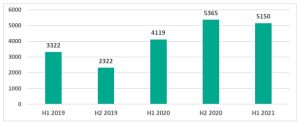
Kaspersky analysis shows the current threat situation in the DACH region: Cyber threats against industrial control systems: fewer attacks in Germany, but more in Switzerland.
Attacks against industrial infrastructures are becoming more diverse and increasing, as the latest Kaspersky analysis of ICS threats in the first half of 2021 shows. According to this, every third industrial computer (33,8 percent) worldwide was exposed to harmful activities, which corresponds to an increase of 0,4 percentage points compared to the second half of 2020; In the DACH region as a whole, the number of attacked computers fell slightly (by 0,12 percentage points), but in Switzerland the number rose by 2,1 percentage points. Cyber criminals use various types of spyware and malicious scripts in their attacks. The Kaspersky experts assume that these threats will increase further in the second half of the year.
Increase in attacks expected
Attacks against industrial companies are dangerous because cyber criminals can disrupt production systems in addition to stealing data and financial resources. In the first half of 2021, Kaspersky solutions blocked over 20.000 malware variants worldwide. The proportion of spyware and malicious scripts used in cyberattacks against industrial systems has been increasing steadily since 2020.
The threat situation in DACH
In general, the percentage of attacked ICS computers in the first half of 2021 fell slightly compared to the second of the previous year in the DACH region: from 14,91 percent to 14,79 percent. However, there are clear differences between the countries. While the number of attacked computers in Austria remained constant (H2 2020: 15,3 percent; H1 2021: 15,5 percent), attacks on ICS systems in Germany fell - from 15,2 percent to 14,8 percent. Cyber criminals, however, are increasingly targeting Swiss ICS computers: while the percentage was 2020 percent in the second half of 11,9, it was 2021 percent in the first half of 14,0.
The Kaspersky analysis shows that the number of malicious scripts has decreased by 2021 percentage points in Germany and Austria compared to the second half of 0,43. In Switzerland, however, there was an increase of 1,01 percentage points. Threat actors use such scripts on various websites that host pirated content in order to redirect users to websites that spread spyware or malware. These were mainly developed to mine cryptocurrencies. In contrast, the number of spyware attacks (Trojan spy malware, backdoors and keyloggers) rose by 1,45 percentage points in Germany, 1,77 percentage points in Switzerland and by 2,34 percentage points in Austria.
More at Kaspersky.com
About Kaspersky Kaspersky is an international cybersecurity company founded in 1997. Kaspersky's in-depth threat intelligence and security expertise serve as the basis for innovative security solutions and services to protect companies, critical infrastructures, governments and private users worldwide. The company's comprehensive security portfolio includes leading endpoint protection as well as a range of specialized security solutions and services to defend against complex and evolving cyber threats. Kaspersky technologies protect over 400 million users and 250.000 corporate customers. More information about Kaspersky can be found at www.kaspersky.com/

